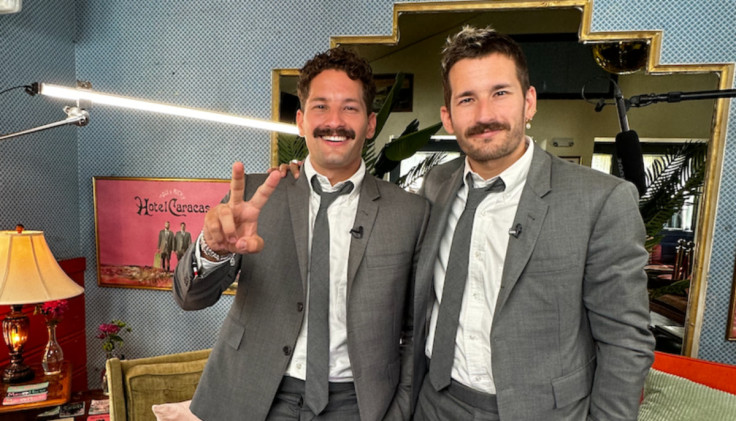
Latin music duo Mau y Ricky's journey to create the songs and music videos for their new album "Hotel Caracas" is a touching reminder of the power of music to bridge distances and heal wounds.
The artists have spent over half their lives away from their homeland, Venezuela. Despite this, their third studio album, "Hotel Caracas," is a heartfelt homage to their country. In an interview with The Latin Times, the Montaner brothers described this album as their "most ambitious, personal and vulnerable, work yet."
Clad in their signature gray suits from the "Hotel Caracas" theme, they delved into the album's creation and its deep connection to Venezuela. They were just out of their contract with their previous music label, and were itching to take that sense of freedom as far as it could go. They were also wrestling with their sense of identity and belonging. Ricky had turned 30 years old, and Mau had his first son, Apolo.
The birth of "Hotel Caracas"
The brothers, the younger sons of Latin music crooner Ricardo Montaner, always knew the album needed to be their road home. "We didn't know how, but we knew it had to led os to Venezuela," explained Ricky.
As millions of Venezuelans, they left their hometown of Caracas 15 years ago. "We had only gone back once for a short visit when our abuelo was sick," the brothers said.
"Hotel Caracas," their first independent release under their label Why Club Records, is a testament to their love for their homeland. The album features 15 tracks that, while rooted in pop and funk, subtly weave in elements of Venezuelan music. The strong presence of brass and wind instruments, alongside the occasional prominence of guitar, echoes the independent music movement of late 20th century Venezuela.
The songs are the essence of Mau y Ricky, a little pop, a little experimental, romantic, with a good dose of reality. They sprinkle their poetic lyrics with bad words in Spanish and some in English. Their point of view is very masculine. Also, sometimes poignant, always funny.
"I am very, very proud of what we achieve with 'Hotel Caracas'; I wouldn't change a thing. It took us two years to get here, and we love the result," said Mau. It also cost them a lot of money. The brothers financed the project themselves, including the better part of a three month trip to Venezuela, where they filmed, under the helm of Daniel Durán, all the music videos and a documentary about the process.
From Venezuela to the world
"We have never been this vulnerable or free when making music," Mau and Ricky admitted. The three months they spent traveling across Venezuela, filming music videos, and reconnecting with their roots, included over 200 local hires, marking a significant investment in their home country.
"That is what makes me the proudest: the fact that we are doing something specific to help the situation," said Ricky.
One of the most poignant moments in the creation of "Hotel Caracas" was recording at Audio Uno studios in Caracas, the same studio where their father, Ricardo Montaner, recorded his first album. This connection to their father's legacy brought deep emotions to the surface. "I cried every day we were there," Mau recalled. The experience was healing, helping them reconnect with their childhood and the stories shared by family and friends.
The return to Venezuela and the creation of "Hotel Caracas" imbued Mau and Ricky with a profound sense of commitment towards their country. "This project generated a great sense of responsibility towards Venezuela for the future," they stated.
The closing track, "Karma," features six minutes of credits listing all those who contributed to the project, ending with the proud declaration, "Made in Venezuela by Venezuelans." This sense of pride and belonging is a driving force behind their work.
A movement
The brothers have always been known for their high-profile collaborations, and "Hotel Caracas" is no exception. The album features tracks with artists like Arcángeland the Dominican group Ilegales. Notable songs include "Gran Día" with Guaynaa, "Vas a Destrozarme," and "Canción 2." However, Mau and Ricky have chosen to keep some collaborations under wraps, inviting listeners to discover these "hidden treasures" as they explore the album. "
With "Hotel Caracas," Mau y Ricky aim to spark a movement of unity among Venezuelan artists. They believe that by working together, they can elevate Venezuela's name on the global stage. The album's closing track, "Karma," features six minutes of credits, listing all those who contributed, ending with the proud declaration, "Made in Venezuela by Venezuelans." This project has rejuvenated their sense of belonging and commitment to their homeland
As they continue to promote "Hotel Caracas," Mau y Ricky remain dedicated to investing in Venezuela and fostering a collaborative spirit among its artists. "The only way to take our country's name further is by doing it together," they asserted, embodying a vision of unity and pride for the future.
© 2025 Latin Times. All rights reserved. Do not reproduce without permission.




